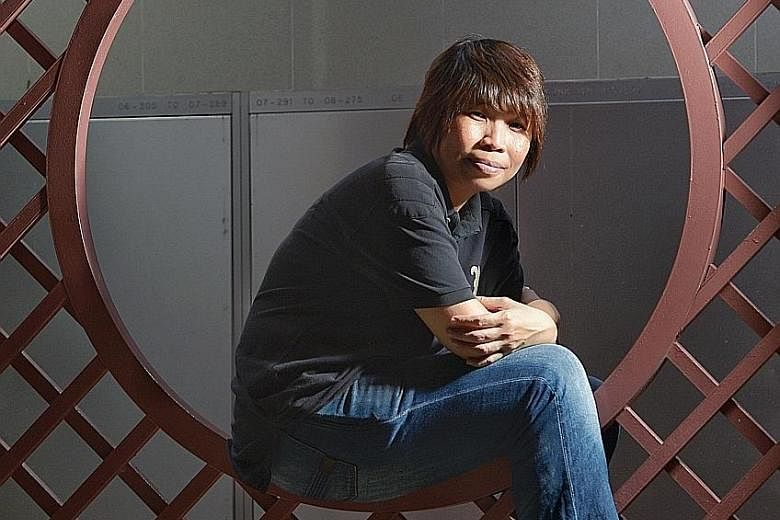Ms Porsche Poh's fingers each bear deep scars, a reminder of when she was 18 and her mother died, leaving her to fend for herself.
"I was lousy at opening cans, even though I did it every day," said the 45-year-old, whose father died of heart disease when she was seven. "I couldn't cook so I depended on canned food."
The orphan and only child also lost the roof over her head because she was not old enough to keep the flat.
Eventually, she opted to join the police force so that she could take shelter in its barracks during the training season.
These life experiences enable her to relate to those who are mentally ill, said Ms Poh, who is now executive director of mental health advocacy organisation Silver Ribbon.
Now in its 10th year, the organisation is arranging its second Asia-Pacific mental health conference to celebrate its birthday. It will be held on Oct 6 and 7, just before World Mental Health Day on Oct 10.
"When people with mental illness tell me that nobody will understand how alone and lost they are, I will share my story with them and they realise that they are 'richer' than me in many ways," said Ms Poh, who is single.
"Those that are suicidal will tell me that they have no other option, but I always tell them that they have choices to make in life."
-
HELPLINES
-
SILVER RIBBON: 6386-1928
SAMARITANS OF SINGAPORE (SOS): 1800-221-4444 (24-hour)
INSTITUTE OF MENTAL HEALTH'S MOBILE CRISIS SERVICE: 6389-2222 (24-hour)
CARE CORNER COUNSELLING CENTRE (for Mandarin speakers): 1800-353-5800
SINGAPORE ASSOCIATION FOR MENTAL HEALTH: 1800-283-7019
TINKLE FRIEND (for primary school-aged children): 1800-274-4788
For instance, Ms Poh is used to having her dinner alone at McDonald's on the eve of every Chinese New Year when families usually gather for a reunion meal.
She does not join her extended family and friends in their Chinese New Year celebrations as she does not wish to impose on them.
She uses the time to visit beneficiaries with mental illnesses, such as depression, schizophrenia or bipolar disorder. She has been doing so for the past decade, since Silver Ribbon was launched in 2006.
"I feel for this group of people because I've worked with them before and having gone through many low points myself, I know that it is likely that I would have broken down if I had been less psychologically strong," said Ms Poh.
In her late 20s, she left the police to join the early psychosis intervention programme at the Institute of Mental Health (IMH) to do something "more meaningful".
During her time there, she identified several issues that left her dissatisfied. People were not coming for treatment early because they were worried about the cost and side effects.
Others recovered and left the psychiatric hospital, but could not find jobs outside because of the stigma of once having a mental illness.
So when she applied for and received a grant of $100,000 to start a mental health Voluntary Welfare Organisation, she quit her job and rented a space at IMH in late 2005.
Then, the stigma surrounding mental health work was strong.
"I reached out to many partners for collaborations and projects but they turned away," said Ms Poh.
Many people were surprised that she managed to get the late former President S R Nathan to officially launch Silver Ribbon in 2006.
"I just wrote to him from my heart about the challenges people with mental illness face and what we hope to do about it and I think he could sense the sincerity," she said.
Today, Silver Ribbon has four centres and employs eight staff. It offers services such counselling and job placement and runs events to raise awareness of mental health issues.
Silver Ribbon is known for its work in promoting the destigmatisation of mental illnesses and pushing for employment opportunities for the mentally ill.
It also hopes to provide support for migrant workers who suffer from serious psychological distress and get employers to provide equal job opportunities for those with mental health issues by removing the need for potential workers to declare any history of mental illness on job application forms.
Ms Poh may be its executive director, but she takes on a number of mental health cases herself. Her weekends are usually spent attending to people with problems. They are referred to her by neighbours, friends, grassroots leaders or even via social media.
"Some of my friends caution me about accepting friend requests on Facebook, but I don't draw boundaries because there is just a thin line between sanity and insanity," said Ms Poh.
She also gives mental health talks in various churches on Sunday. She became a Christian two years ago.
"I was from Fairfield Methodist where I scored A in Bible Knowledge class, but I held back from believing because I used to blame God for taking away my parents," she said.
"I have since come to terms with it and I hope to help my clients to try to understand life through the challenges they face."


